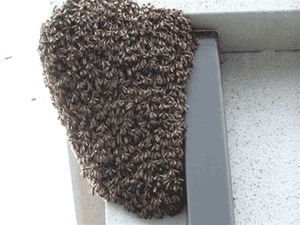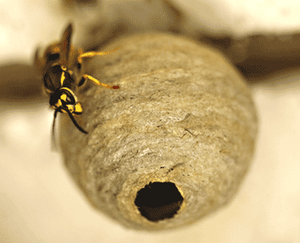Questions answered about wasps - Page:14
Do hornets fly far from their nests?
Hornets and wasps can fly a considerable distance from their nests when foraging for food.
When a food source is located, the position is relayed back to the nest, so other workers can exploit the food source until it is depleted.
Hornets are also nocturnal, and if you have large insects tapping on your windows at night (due to your lights being on), you usually have a hornet's nest within view of your house.
Would honey bees nest in a chimney?
Honeybees are renowned for nesting in chimneys; we think it is their favourite nesting location.
It is rare for wasps to nest in chimneys, although we do see this occasionally.
If you have a honey bee nest in your chimney, bees will fall down the flu every day and enter the house through the fireplace. You will also be able to hear the bees up the flu.

What does a wasp nest look like when it starts?
A starter wasp nest looks like a grey golf ball suspended from something.
The nest starts with a stalk; then over a week or two, a shroud will be built around it. From this point, the nest will gradually get more prominent.

How long does a queen wasp live?
A queen wasp or hornet will live for one year. After hatching in the autumn, she hibernates over winter, builds a brand new nest in the spring, and lives in the nest throughout the summer. She will produce new queens in the autumn and then die with all her workers.
Does the queen wasp stay in the nest when all the others leave in winter?
A queen wasp dies in the autumn along with her workers. She hatches new queens ready for the following year.
